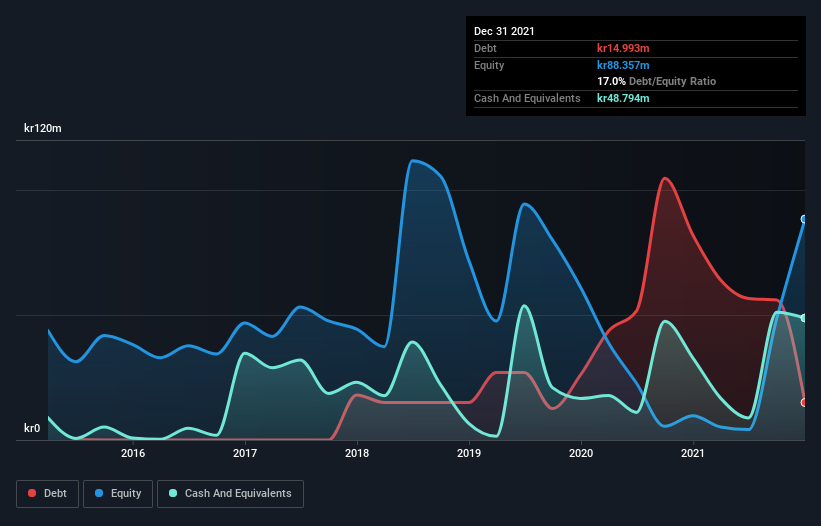
David Iben put it well when he said, 'Volatility is not a risk we care about. What we care about is avoiding the permanent loss of capital.' So it might be obvious that you need to consider debt, when you think about how risky any given stock is, because too much debt can sink a company. As with many other companies Cortus Energy AB (publ) (STO:CE) makes use of debt. But is this debt a concern to shareholders?
When Is Debt Dangerous?
Debt is a tool to help businesses grow, but if a business is incapable of paying off its lenders, then it exists at their mercy. Ultimately, if the company can't fulfill its legal obligations to repay debt, shareholders could walk away with nothing. While that is not too common, we often do see indebted companies permanently diluting shareholders because lenders force them to raise capital at a distressed price. Of course, debt can be an important tool in businesses, particularly capital heavy businesses. When we examine debt levels, we first consider both cash and debt levels, together.
Check out our latest analysis for Cortus Energy
What Is Cortus Energy's Debt?
As you can see below, Cortus Energy had kr15.0m of debt at December 2021, down from kr81.9m a year prior. But it also has kr48.8m in cash to offset that, meaning it has kr33.8m net cash.

How Strong Is Cortus Energy's Balance Sheet?
According to the last reported balance sheet, Cortus Energy had liabilities of kr28.9m due within 12 months, and liabilities of kr11.4m due beyond 12 months. Offsetting this, it had kr48.8m in cash and kr2.15m in receivables that were due within 12 months. So it can boast kr10.7m more liquid assets than total liabilities.
Having regard to Cortus Energy's size, it seems that its liquid assets are well balanced with its total liabilities. So it's very unlikely that the kr558.7m company is short on cash, but still worth keeping an eye on the balance sheet. Simply put, the fact that Cortus Energy has more cash than debt is arguably a good indication that it can manage its debt safely. There's no doubt that we learn most about debt from the balance sheet. But you can't view debt in total isolation; since Cortus Energy will need earnings to service that debt. So if you're keen to discover more about its earnings, it might be worth checking out this graph of its long term earnings trend.
Given its lack of meaningful operating revenue, Cortus Energy shareholders no doubt hope it can fund itself until it can sell some combustibles.
So How Risky Is Cortus Energy?
Statistically speaking companies that lose money are riskier than those that make money. And we do note that Cortus Energy had an earnings before interest and tax (EBIT) loss, over the last year. And over the same period it saw negative free cash outflow of kr73m and booked a kr79m accounting loss. With only kr33.8m on the balance sheet, it would appear that its going to need to raise capital again soon. Overall, its balance sheet doesn't seem overly risky, at the moment, but we're always cautious until we see the positive free cash flow. The balance sheet is clearly the area to focus on when you are analysing debt. But ultimately, every company can contain risks that exist outside of the balance sheet. For instance, we've identified 6 warning signs for Cortus Energy (3 are significant) you should be aware of.
At the end of the day, it's often better to focus on companies that are free from net debt. You can access our special list of such companies (all with a track record of profit growth). It's free.
New: AI Stock Screener & Alerts
Our new AI Stock Screener scans the market every day to uncover opportunities.
• Dividend Powerhouses (3%+ Yield)
• Undervalued Small Caps with Insider Buying
• High growth Tech and AI Companies
Or build your own from over 50 metrics.
Have feedback on this article? Concerned about the content? Get in touch with us directly. Alternatively, email editorial-team (at) simplywallst.com.
This article by Simply Wall St is general in nature. We provide commentary based on historical data and analyst forecasts only using an unbiased methodology and our articles are not intended to be financial advice. It does not constitute a recommendation to buy or sell any stock, and does not take account of your objectives, or your financial situation. We aim to bring you long-term focused analysis driven by fundamental data. Note that our analysis may not factor in the latest price-sensitive company announcements or qualitative material. Simply Wall St has no position in any stocks mentioned.
About OM:CE
Medium-low and overvalued.
Market Insights
Community Narratives



